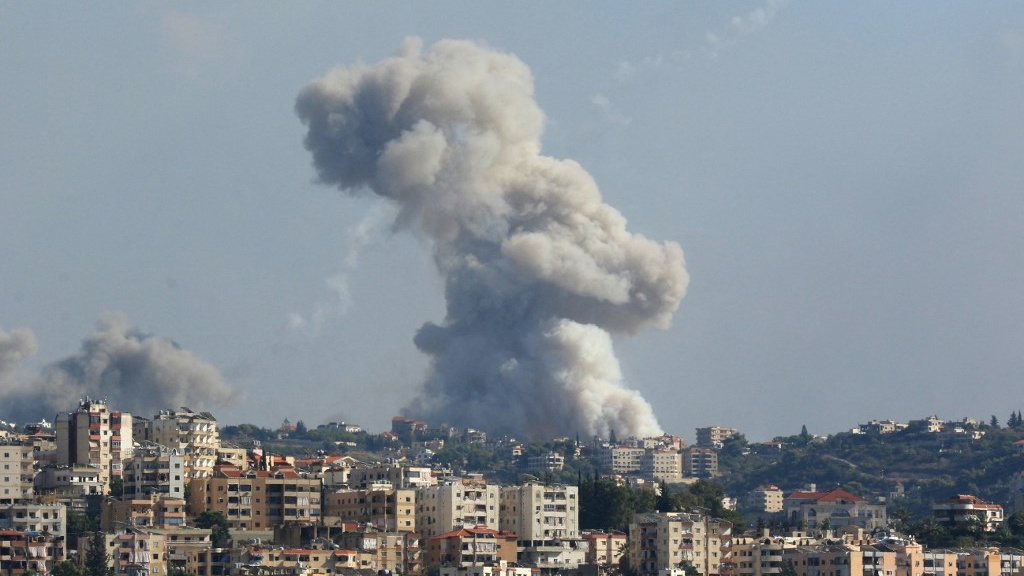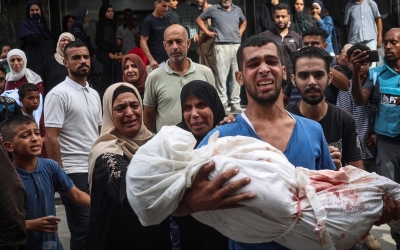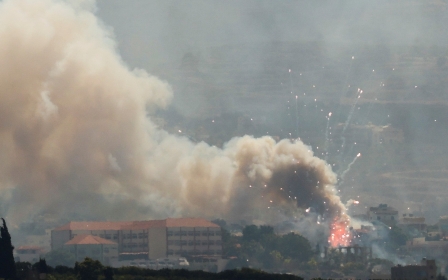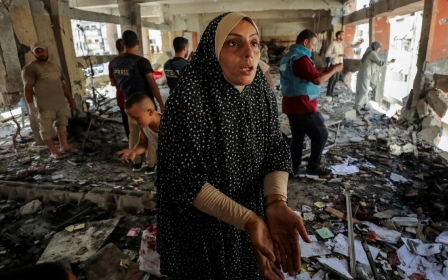Israel-Lebanon war: After a difficult summer, a campaign of terror begins

The escalation of Israel’s aggression against Lebanon this week appears to have ushered the country into a new phase of conflict, after Hezbollah’s nearly year-long war of attrition.
Israel signalled its preparedness for a broader and more comprehensive conflict in late July, with the killing of Hezbollah commander Fuad Shukr.
This month, by blowing up communications devices across Lebanon and killing hundreds of people - including women and children - in a series of air strikes, Israel’s objectives appear to have expanded significantly beyond the mere containment of Hezbollah along the border.
This war is no longer just about dissuading Hezbollah from taking action to support Palestinians in Gaza. Rather, Israel wants to dismantle Hezbollah entirely.
This strategic shift is unfolding in a context where Israeli public opinion is largely in favour of military action against Lebanon, while Lebanese society remains divided over the war.
New MEE newsletter: Jerusalem Dispatch
Sign up to get the latest insights and analysis on Israel-Palestine, alongside Turkey Unpacked and other MEE newsletters
In the wake of Shukr’s assassination, as Hezbollah grappled with a precarious calculus on how to retaliate without inciting an all-out war, Israel interpreted this hesitation as indicative of Hezbollah’s military frailty and lack of strategic clarity.
This month’s pager attacks abruptly concluded a tumultuous summer, paving the way for a campaign of terror this autumn.
No red lines
In addition to underscoring the widening technological divide between the two states, the pager attacks also signalled that Israel had abandoned its previous red lines in Lebanon, while revealing the increasing visibility and predictability of Hezbollah’s operatives from the vantage point of Israeli intelligence. The group’s clandestine networks were unmasked.
Then came Israel’s air strikes, which have killed more than 550 people so far this week and triggered an exodus of southern Lebanese civilians towards central areas.
Follow Middle East Eye's live coverage of the Israel-Palestine war
Despite genuine solidarity among Lebanese people in the face of this crisis, it is crucial to recall that the country was already grappling with financial collapse, political paralysis, and divisions over Hezbollah’s strategy. Humanitarian solidarity alone cannot bridge the country’s stark lack of social cohesion.
And while Hezbollah has sustained significant blows, it is not powerless. It continues to target Israeli military assets around Haifa and prevent many settlers in the north from returning to their homes. Yet, it remains cautious, as if there might still be a way to avoid all-out war.
For Israel, the war in Gaza is nearly behind us, with the bulk of the confrontation shifting northwards
For Hezbollah, there is no question of allowing settlers to return home before the cessation of Israel’s genocidal war on Gaza. But for Israel, the war in Gaza is nearly behind us, with the bulk of the confrontation shifting northwards.
In Lebanon, there are few hopes that anyone will exert serious pressure on Hezbollah to withdraw from this conflict - but internal dissent is growing particularly among the US-backed factions.
Hezbollah is like a fully equipped car that cannot reverse. It increasingly seeks to uphold its principle that there can be no appeasement with Israel without an end to the genocidal war on Gaza.
Simultaneously, this conflict has underscored Lebanon’s position as a neighbour to an Israel whose brutality cannot be solely attributed to reactions against Hamas and Hezbollah.
Sectarian hostilities
Indeed, Israel appears committed to establishing a racial hierarchy in the regional context, reviving sectarian antagonisms within Lebanon.
While it is premature to draw definitive conclusions, the current confrontation must also be assessed through the lens of inter-communal animosities. As the war escalates dramatically, internal dissent might rise further, leading to unpredictable consequences.
In the meantime, is a ground invasion imminent? While it is hard to say for certain, it has become evident that the conflict is shaping up to be overwhelmingly one-sided.
An Israeli military landing deep within Lebanon, perhaps beginning from the airport area, cannot be dismissed.
Have we reached an era reminiscent of the 1982 Israel-Lebanon war? This question might seem apocalyptic at the present time - but Lebanon is ensnared more than ever before in a regional conflict.
At the same time, mobilisation in solidarity with Gaza - and now with Lebanon as well - is minimal in Arab and Islamic countries, while remaining more vigorous in the West. This reflects a profound malaise across the Arab world, at a time when Israel is governed by the most extremist and fascist elements in its history, who are profoundly committed to a vision of racial hierarchy.
The views expressed in this article belong to the author and do not necessarily reflect the editorial policy of Middle East Eye.
Middle East Eye delivers independent and unrivalled coverage and analysis of the Middle East, North Africa and beyond. To learn more about republishing this content and the associated fees, please fill out this form. More about MEE can be found here.






